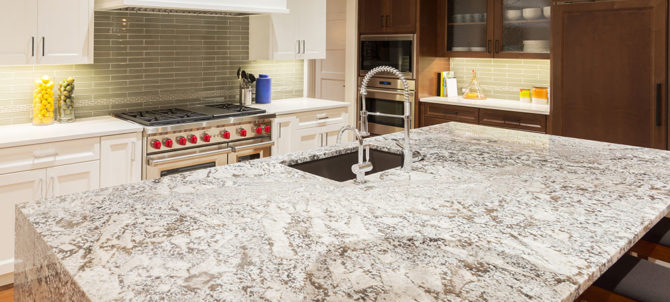
When you buy granite countertops, you’re making a long-term investment. Due to this, you need to be cautious when making the purchase. To help you out, here is how to tell that you are buying high-quality granite:
Check the thickness of the countertops.
A significant portion of granite’s cost can be attributed to its natural form when taken from the earth. Granite solidifies into enormous slabs. Once harvested, these massive blocks must be transported to a manufacturing plant, where workers chop them into commercially viable pieces.
Many producers cut some parts too thin to maximize their granite yield. When granite is excessively thin, its durability suffers, resulting in poorer-quality granite that scuffs more easily and needs to be replaced years sooner than thicker pieces.
High-quality granite countertops must be 1 to 1 ¼ inches thick. So, you should measure the thickness of your countertops when buying and ensure they are the right size.
Find out the origin of the countertops.
No location can claim a monopoly on the granite industry. It can be found worldwide, from China to Europe and the Americas. Granite’s provenance does not always define its quality. However, the country of origin influences its pricing.
Granite slabs from China, for example, are sold at a lower cost due to reduced labor costs. Higher-cost countries, such as Italy and Brazil, demand more for quality.
In addition to labor costs, shipping charges significantly impact the price of granite. Granite is expensive to transport due to its heavy weight. This means that you can receive the best deal on granite sourced near home.
How does the granite look like?
To assess granite quality, you must inspect it closely. Do you notice any dings, dents, scratches, or uneven surfaces?
Any imperfections indicate low-quality granite. Good granite can sustain everyday household use; therefore, if yours has wear and tear, the quality is likely substandard. Also, exercise caution while acquiring any blemished granite. High-quality components are free of scratches and dings.
When making the purchase, look for cracks. Remember that even little fissures can expand into enormous chasms over time, so avoid them.
Determine the porosity of the countertop.
Top-grade granite is resistant to liquid absorption. If a chunk of granite is overly porous and allows liquids to seep inside, it is a low-quality slab with a short lifespan. In addition, extending the life of porous granite necessitates the regular application of costly sealants.
To test porosity, squeeze a drop of lemon juice onto the surface. How long does it take for the granite to absorb the liquid? If it absorbs quickly, the porosity is high, and you don’t want this. Slow or no absorption implies high-quality granite, and this is the one you should get.
Consider the grade of the countertops.
Granite countertops typically come in three grades. Before you spend your hard-earned money, buy the greatest granite for your needs. The primary grades are:
Entry-level granite: This granite is regarded as commercial grade, but it is of lesser quality. Typically, it is thinner than other grades and comes from China.
The granite is strengthened with a cardboard backing. While thinner than the other classes, it is also less expensive, making it a popular apartment option. This granite is available in various attractive colors and is quite durable. It is important to note that it is unsuitable for regularly used rooms.
Mid-grade granite: This granite is usually imported from India or Brazil. It is approximately ¾” thick and far more durable than grade 1. This option is most commonly used in homes due to its hardness and lower cost than Grade 3. It comes in a variety of distinctive and striking colors.
High-grade granite: This granite is the most expensive, ranging between $60 and $100. It is of the highest quality and contains the most unique colors and designs. High-quality granite is widely utilized for kitchen surfaces and around fireplaces.
Assess the polish quality.
The polish quality is critical to ensure you receive a high-grade granite. Low-quality polish will not withstand prolonged use. There are several ways to assess polish quality.
The first option is to use the lemon drop or water test, as described above. This test allows you to examine the porosity and polish quality at the same time.
You can also scratch the surface with a metallic material such as a coin. If the coin leaves a mark, the polishing is poor, and the granite will tarnish soon, and you don’t want this.
Work with a countertop professional.
With a bit of research and effort, you can ensure that you purchase high-quality granite countertops, which most people want.
Many people think they only need the highest-grade countertops, but this isn’t always the case. If a lower grade is appropriate for your needs, go for it.
You only need to ensure that it’s well-made and it will withstand the test of time.
Remember that the countertop industry has plenty of shady people who might try to exploit you.
Simply because you assume you are paying for a high-quality countertop does not imply that you are. Always work with a trustworthy granite countertop dealer to obtain the best value for your money.
Even after installing the countertops, you should note that you must take good care of them. This calls for you to avoid placing hot items on the countertops.
You should also seal the surfaces at least once a year. You can do the sealing yourself, but for the best outcome, let experienced granite contractors Durham help you out.